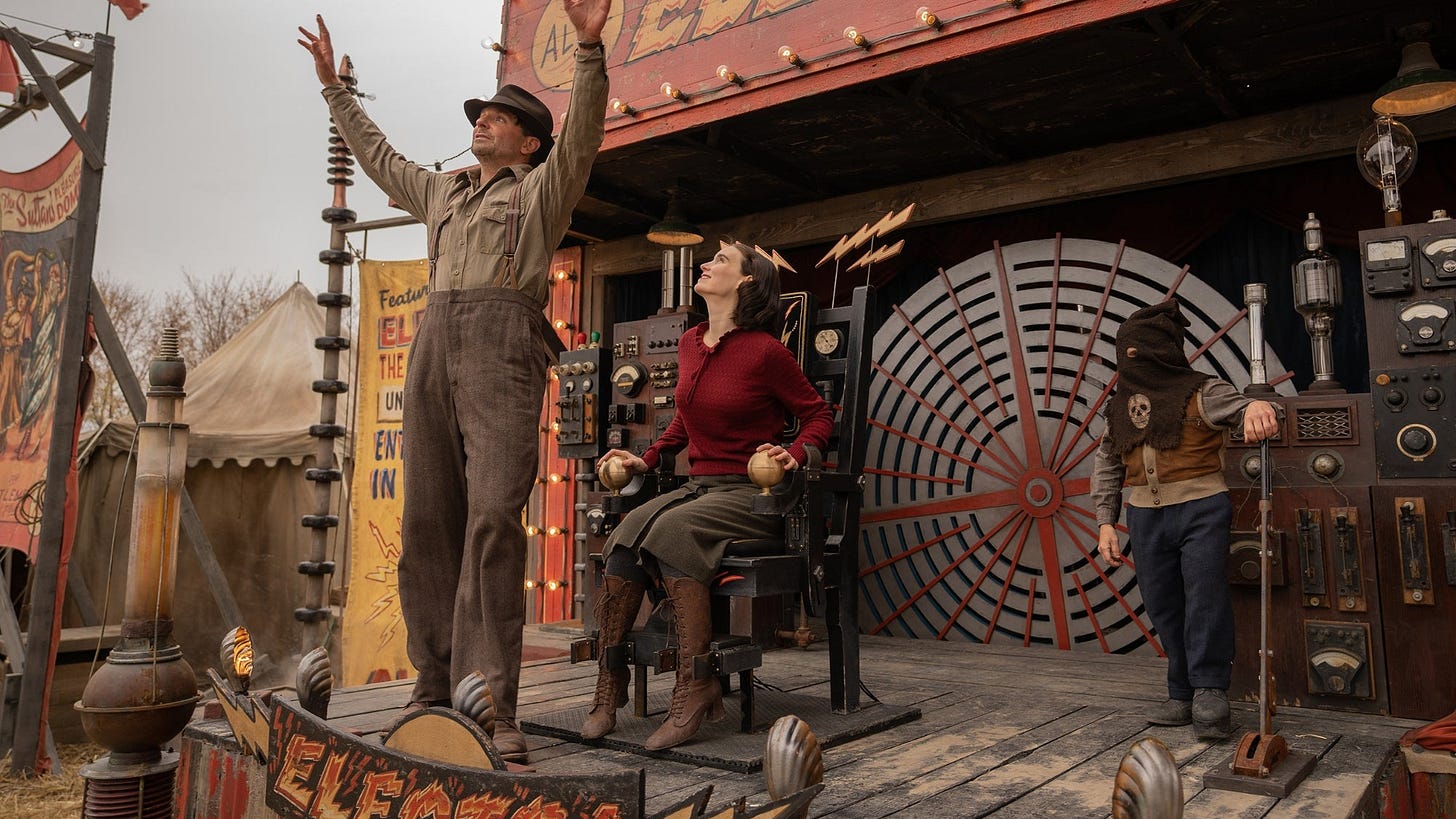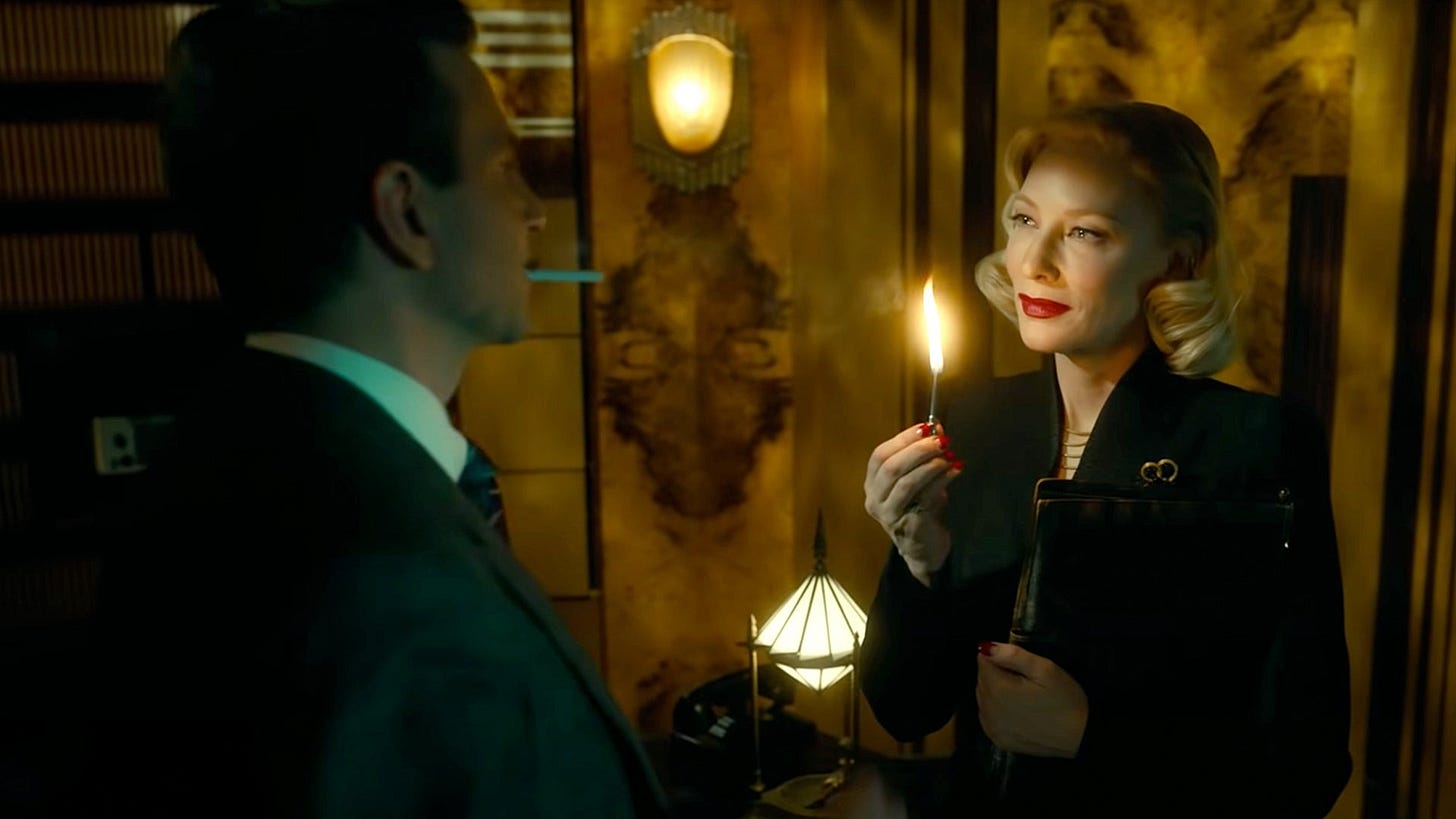In prison, there was a time I received, from the outside, a gorgeous bound book collecting a number of classic, famous noirs, reprinted with minimal legal fuss due to the age of the tales. Within this wonderful volume was my favorite of the bunch, William Lindsay Gresham’s “Nightmare Alley”. The story, which I had never previously read, feels soaked in squalor. When the protagonist drank, it was as if the pages were moist with bourbon. It’s powerfully, delightfully scatological, in content but also suggestion. It’s seedy, in other words, not exactly a feel-good tome.
In 1947, the material was still fresh when it was adapted into a film by director Edmund Goulding. The result is an entertaining, fast-paced noir that notably sands off some of the edges of the story. A handsome adaptation, one that allows for more Big Acting Moments and just a smidgen of redemption within its finale, the first movie is a memorable genre offering from the still-limited 1940’s, as far as depictions of tales of murder and intrigue.
Guillermo Del Toro opted to try his hand at the material, and the result is the superior of the two screen adaptations. Surprisingly, considering Del Toro is respected as a horror filmmaker, this film doesn’t revel in the grue or the violence (to say nothing of the sex). In fact, superficially, this may be the lightest R-rated movie one could conjure. But that would be based on whether or not the film has cheap thrills. In fact, “Nightmare Alley” trades on a darker sort of morality and mortality, one that probably would be lost on a younger viewer.
Bradley Cooper appears as Stan, playing the character from youth until, roughly, middle-aged. I will say this is a shortcoming, but one that plays in the movie’s favor. So many modern movies opt to cast young and have the actor survive until years beyond their off-screen self, hinting at a gravity that isn’t clearly reflected on the actor’s face. Better to start young with an older face, letting Cooper age into who he’s meant to be, making the tragedy hit harder. If a character completes a linear arc, you want the final moments to be with the actor looking as human as possible, not caked in makeup and covered in prosthetics. Cooper’s being too old for the role, which initially creates an unspoken question within the mind of the view, gradually contributes to his eventual downfall.
What’s interesting is that the movie opens with a great gag that I won’t spoil, mostly because it suggests the movie is beginning at the end (or in media res) before flashing back. Instead, it’s a little added backstory on Stan, the opportunist. It’s the late thirties, and Stan is on the run, deciding to hide out with carnies. He’s mesmerized by his new trappings, glamorous but threatening, fun but dangerous. He’s in awe of being backstage with the acts, but in a way that suggests he thinks he’ll get stabbed if he isn’t paying attention.
He falls in with mentalists, Madame Zeena (Toni Collette) and her dapper husband Pete (David Strathairn). Gradually, they open up to Stan, showing him the secrets of their mind-reading show. It’s unclear who is playing whom, since Stan sees a weakness and an opening when Pete keeps teaching him the tricks, but surely Pete is aware Stan is regularly going to bed with Zeena when Pete’s not drowning in a mug, and maybe when he is. Turns out, mind-reading is just a wink, a gag, rapport and guesswork, and every audience falls for the act because they want to. Stan builds from this foundation of this routine to create a bit with circus girl Molly (Rooney Mara), where she goes from electrocution fodder to Stan’s secondhand woman. That is, on-stage and in bed, to Zeena’s chagrin.
Ignoring warnings from the local strongman (Ron Perlman, continuing a fruitful and often touching partnership with Del Toro), Stan whisks Molly away into a world of lonely basements and questionable wealthy crowds – he is now The Great Stanton, his show now on the road as he questionably pushes the bounds of his act outside the protection of the circus tent. A great touch within the story is that Stan is warned not to act as if he can talk to the dead. This plays like a potential summoning of ghosts and spirits, but really, the reasons are that such a lucrative world can fall apart so quickly if he is exposed. Ir’s too much work, too inconvenient. The moral implications of faking a connection with the dead are never even discussed. These are professionals.
At this point, Stan is as high in the sky after one successful show after another. Thinking he boasts control over the world, he is instead susceptible to manipulation from a therapist and seductress, the therapist Dr. Ritter (Cate Blanchett). It’s interesting as far as Stan’s sexual interests that he found himself gravitating towards two powerful, assertive older women, particularly considering we don’t know anything about his mother (Molly, meanwhile, becomes just another prop in his show). Much of “Nightmare Alley” has suggestions or reminders that lean dark. Everyone has a secret, and many of those secrets are loaded with our own uncomfortable predilections and hobbies. Kinks, even.
“Nightmare Alley” very early on, literally and figuratively, tells the audience exactly where it’s headed (a moment preserved from the book and the earlier film). This, combined with the be-careful-what-you-wish-for narrative, seems to rob the tale of narrative momentum. Perhaps that’s the key to the film’s commercial failure – the other being COVID, which kept people away from theaters in 2021 unless they were part of the superhero cult. But “Nightmare Alley”, while packing conventional thrills, isn’t entirely thrilling. Maybe it’s an actual horror film, a novelistic one, where we witness a man compromise his own humanity so far, so slowly, until he ceases to be. It’s Del Toro’s own compassion that allows this to remain a tragedy, and not just another miserable jerk abusing the gullible. By the third act, you’re perturbed, alarmed and, in spite of all else, saddened. It’s an element missing from the book. It’s a welcome addition.
I’ve written before about politicians voluntarily being killers. What can’t be debated is that many elected officials are murderers, zealously operating on behalf of victims to pervert justice into revenge. What is a shock to the system isn’t that they kill – it’s how far out of the way they’ll go to kill people, men and women they’ve never met. They claim justice for the victims, but its naked desire to do violence towards another, sanctioned by the state. The article above is in reference to the men who were removed from Death Row under Death Row, their sentences reduced to life in prison. Hardly a gesture of kindness – a lifetime marginalized in prison is as deep a spiritual death as you could conjure. Joe Biden nonetheless did not want to be remembered as a killer, something the new administration considers quaint.
Now, state prosecutors who have seen federal death row statuses removed (the president can intervene in federal cases, not state) are looking to prosecute these men once again. These men will be in prison forever, and now we’re going to waste time and money to prosecute them again? The hope for this administration is that these men be placed back in Death Row, seemingly using them as pawns in an attempt to childishly one-up Joe Biden. Nobody needs a death sentence. And if they’ve had one removed, you should be entitled to celebrate your lucky escape. It’s important to note these prosecutors are scumbags and need to be treated as so.









It always baffles me how we treat prosecution as one "side" of a debate. That makes sense for the most part for the Defense attorneys - you need to make sure they're not throwing you under a bus just because they think you may or may not be guilty. But prosecutors actually should be all about determining the truth, and aiming for a punishment that fits the crime. Instead, it's pure gamesmanship, how MUCH can they pin on their target, how severe the sentence, how many can they convict, with no real consequence for shifty behavior in order to achieve these goals. That makes ZERO sense from a criminal justice perspective. The STATE is not the victim, they are not arguing for "their side", their interest should be in justice to the best of their ability to determine it, not "conviction." I watched the Donnie Yen movie THE PROSECUTOR this past weekend, about an ex-cop turned prosecutor who upends the whole system by giving a shit about the truth and fairness. An EX-COP (insert howls of laughter here.) It was a nice fantasy. Action kicked ass. Yen and Tom Cruise need to do a geriatric Rush Hour asap.
That all said, I have the novel of Nightmare Alley - one of these days! I'll read it and watch both movies. But I gotta do it in that order.